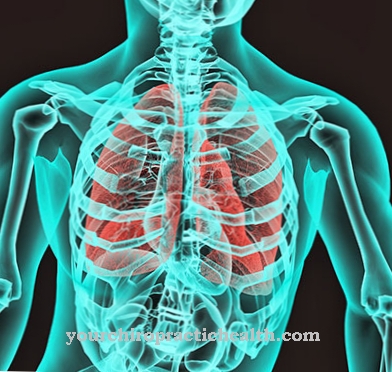The endemic syphilis is a non-venereal variant of syphilis. The pathogen is the bacterium Trepnoma pallidum ssp. endemica. The treatment consists of giving penicillin for several weeks.
What is endemic syphilis?

© designua - stock.adobe.com
Endemics are diseases that occur in a specific population or a limited area. Syphilis, for example, exists as an endemic variant in Africa, the Arabian Peninsula and the Middle East. Every form of syphilis is a sexually transmitted disease as a result of infection with the Treponema pallidum bacterium.
In contrast to normal syphilis, "the transmission of endemic syphilis does not take place venereally. Infections occur through smear infection and are the result of close social contact in socio-economic mostly poor conditions. The endemic form of syphilis is also called Bejel or Njoverav and primarily affects children between the ages of four and ten.
The non-venereal transmission route in this case means infection without sexual contact. Endemic syphilis mainly affects nomadic population groups in close social groups with poor hygienic conditions. The endemic form of syphilis is most widespread among the nomads of the Sahel zone, the pygmies between the Republic of Congo and Central Africa, and among Bedouin peoples in Saudi Arabia.
Arid areas such as Iraq, Iran, Kazakhstan, Turkmenistan, Uzbekistan, Afghanistan and Xinjiang were also risk areas in the past. Internal names are Frenga, Dichuchwa, Siti and Skerljevo.
causes
As with "true syphilis", a gram-negative screw bacterium of the family Spirochaetaceae is the pathogen causing endemic syphilis. Initially, a special type of bacteria called trepnoma endemica was identified for endemic syphilis. However, since the pathogen is very similar to the pathogen causing "real syphilis", both bacterial species are now treated as subspecies of the Trepnoma pallidum species.
For endemic syphilis, the subspecies is more precisely Trepnoma pallidum ssp. endemica. The subspecies lacks some of the pathogenicity factors that the causative agent of "true syphilis" possesses. Unlike “real syphilis”, endemic syphilis cannot infect nerve tissue or survive in scar tissue. There are no morphological differences between the two pathogens.
Both are helical bacteria with a length between five and 20 µm and a width between 0.1 and 0.4 µm. The mode of locomotion of both pathogens consists of longitudinal rotational movements.
Because of the environmental instability and sensitivity to drought, both bacteria are mainly transmitted in direct skin or mucosal contact. Bejel is transmitted somewhat less frequently when breastfeeding or through indirect contact, such as that caused by flying or sharing dishes.
Symptoms, ailments & signs
Like all bacteria of the species Trepnoma, Bejel is characterized by a course of several phases. Open skin wounds are the main symptom. The primary lesions occur at the point of entry of the bacterium and are often not directly visible. After an incubation period of up to three months, the corners of the mouth of the affected person become infected.
Smaller lesions appear on the oral mucosa. The ulcers bleed easily. Occasionally there are visible sores in the anogenital region or on the larynx. Skin changes and bone involvement are possible but not particularly common signs in the early stages. During the first stage, the general condition of the patient is usually not affected.
The latent stage of infection occurs after around six to nine months. The long tubular bones of the tibia and the facial bones of the nasal bone are affected. A proliferative, deforming periostitis occurs. There are ulcerating skin lesions or larger skin defects. Sometimes the infection progresses for years and ends in disfiguring tissue defects. The central nervous system and the heart are spared in contrast to "real syphilis".
diagnosis
The diagnosis of endemic syphilis requires the microbiological detection of the bacterium Trepnoma pallidum. During routine examinations of the tissue or, in most cases, the thin bacteria cannot be identified. Native dark field microscopy or specific fluorescence microscopy is usually required to detect the pathogen.
In the early phase of the disease, antibodies are present which are confirmed by means of the Treponema pallidum hemagglutination assay and fluorescence Treponema antibody absorption test. The distinction from "real syphilis" is only possible in a special laboratory. The prognosis for patients with endemic syphilis is much better than for patients with “real syphilis”.
Complications
A number of complications can arise with endemic syphilis. After a few weeks, the pathogens spread throughout the body and also affect the lymph nodes, among other things. In the secondary stage, it comes to a skin rash and sometimes severe bone, intestinal and meningeal changes.
In the tertiary stage, endemic syphilis causes further inflammation of the bones and heart. Possible inflammation of the aorta increases the risk of an aneurysm significantly. So-called gums are rarely formed. These tumors can appear externally on the skin and also affect the internal organs and the skeleton.
It is also characterized by a progressive decline in personality, which often takes years and is irreversible. In the first and second stages, the disease is also highly contagious. In infected women, the pathogen can penetrate the embryo during pregnancy and lead to congenital syphilis in the child. If endemic syphilis is not treated, it can lead to death years later. It is therefore advisable to consult a doctor immediately if you suspect syphilis.
When should you go to the doctor?
If the person concerned suffers from unusual wounds on the skin, it is advisable to consult a doctor. If the wounds recur or the frequency of occurrence increases, a doctor's visit is necessary. There is a risk of germs entering the organism through the open wounds, which can lead to further diseases. A doctor should be consulted as soon as a general feeling of malaise, dizziness or a feeling of physical weakness develops.
Repeated inflammation of the corners of the mouth should be clarified, examined and treated by a doctor. If the corners of the mouth tear again over a period of several weeks or months, it is advisable to seek medical care for the organism. A doctor should be consulted if there are symptoms of the oral mucosa or changes in the skin texture. Wounds in the region of the larynx are considered unusual and should be examined by a doctor.
Often the state of general well-being decreases in a gradual process. A visit to the doctor is advisable as soon as the changes in the deteriorated general condition are noticed in everyday life. A doctor should be consulted if there is pain in the bones, internal restlessness or a vague feeling of illness. If there are emotional problems, an increased experience of stress or persistent depressed feelings, it is advisable to consult a doctor.
Doctors & therapists in your area
Treatment & Therapy
Endemic syphilis is a bacterial infection. Like most other infections, treatment primarily requires targeted antibiotic therapy. Antibiotic treatment extends for at least two weeks for patients with endemic syphilis.
Penicillin is used as a drug. In the case of a mild illness in the initial phase, a single administration of depot preparations is often sufficient. Despite increasing bacterial resistance, the pathogens causing endemic syphilis are not yet resistant to penicillin.If the patient is hypersensitive to penicillin, macrolides and tetracyclines are used instead of the drug.
In the case of severe illness at a later stage, conservative drug treatment of endemic syphilis is continued for longer. The bacteria often break down on a massive scale during therapy. A Herxheimer reaction with acute symptoms of intoxication is conceivable for this reason. After antibiotic therapy, there are often severe tissue defects that can later be corrected or reconstructed in the course of plastic surgery.
Outlook & forecast
The prognosis for patients with endemic syphilis depends on various factors, but cannot be reliably predicted in individual cases. In general, starting treatment early has a positive effect on the disease prognosis for endemic syphilis. In addition, the general state of health of the patient and the hygienic conditions play a decisive role.
If patients seek medical treatment at an early stage of endemic syphilis, the disease can often be kept under control with drugs. Since complications are possible at any time even during adequate therapy, close medical monitoring of the patient is of great relevance.
Once the treatment with antibiotic agents is complete, pronounced defects in the affected person's tissue often remain. In such cases, plastic surgeons will reconstruct the appropriate areas if desired and possible. However, there are often scars or other externally visible defects that can no longer be repaired.
The prognosis for endemic syphilis without suitable medical therapy is comparatively poor. This is because the infectious disease affects various areas of the organism over time and sometimes leads to the death of the patient several years after the infection. Before that, those affected suffer from endemic syphilis from numerous complaints that severely limit the quality of life and make sudden complications likely.
prevention
A preventive vaccine against treponema is not yet known. For this reason, prophylaxis in the case of endemic syphilis is limited to avoiding close social contact in the areas described and improving hygienic conditions.
Education about the disease and how it is transmitted is considered by researchers to be the most important preventive step. The pathogen should be eliminated from the population groups at risk through improved medical care.
Aftercare
With this disease, the person concerned is primarily dependent on a very quick diagnosis with subsequent treatment to alleviate the disease. If an early diagnosis is not made, this can lead to severe complications and a significant worsening of the symptoms, so that the early detection of this complaint is usually in the foreground in this disease.
The earlier the disease is recognized, the better the further course is usually. In most cases, the disease is treated with medication, mainly antibiotics. When taking antibiotics, ensure that the dosage is correct and that they are taken regularly. They should also not be taken together with alcohol, as this can significantly weaken the effect.
In most cases, they must be taken for a few days after the symptoms have subsided in order to completely relieve the symptoms over the long term. In the case of children, parents in particular must ensure that they are taken correctly and regularly. Further aftercare measures are usually not necessary, although the life expectancy of the person affected is usually not reduced if treatment is timely.
You can do that yourself
Endemic syphilis proceeds in phases, with a large number of complications to be expected, especially in the later stages. In the early stages, the disease shows hardly any symptoms, but it is highly contagious during this time. Since, unlike in true syphilis, no sexual contact is required for the pathogen to be transmitted, the patient's entire near-social field is at risk.
This circumstance is usually very stressful for the person concerned. In addition, the existence of a non-venereal form of syphilis is not widely known. The diagnosis of syphilis is therefore often associated with stigmatization. The patients feel ashamed of their illness, which increases the mental suffering.
In this situation, those affected should join a self-help group. They can also be contacted online via the Internet. Patients who are mentally suffering should not be afraid to consult a therapist.
Not many self-help measures are available against the physical consequences of the disease. However, it is extremely important that those affected take it easy and drink enough to compensate for the loss of fluids caused by diarrhea. In addition, the medication must be taken as prescribed and all follow-up examinations actually performed.


.jpg)
.jpg)
.jpg)








.jpg)

.jpg)
.jpg)











.jpg)